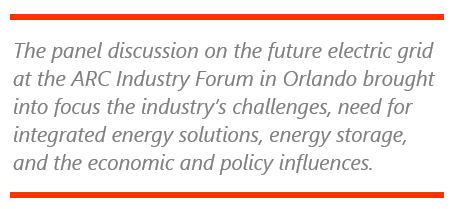

The panel discussion on the future electric grid at the ARC Industry Forum in Orlando this past February brought into focus the industry’s challenges, need for integrated energy solutions, energy storage, and the economic and policy influences.

Joining them on the panel from the technology supplier side were Chris Evanich, Program Director, Energy as a Service, Schneider Electric; Jamie Stapleton, Global Digital Portfolio Manager, ABB Power Grids; and Michael Legatt, Founder and CEO, ResilientGrid. Rick Rys, Senior Consultant, ARC Advisory Group, moderated the panel discussion, which included responses to targeted questions from the audience.
End users typically seek reliable, resilient and stable sources of energy. In North America, the NERC Bulk Electric System (BES) Definition is used to determine the parts of the North American electric transmission system that are “BES Elements” and thus critical to reliable operation of electric power systems. Owners of BES Elements are required to comply with all applicable NERC reliability standards. Mr. Chanoski of ISAC was asked if the 15 BES (Bulk Electric System) elements listed in his previous presentation was representative or comprehensive. He responded that his list was comprehensive and that all 15 came through the US reliability coordinators designated by NERC.
In the discussion on energy as a service, Mr. Evanich of Schneider Electric said that since large commercial, industrial, and institutional customers seek to avoid costly outages, they often look for options to the utility, such as installing their own captive generating units. This trend is gaining traction in universities (where outages disrupt both research and educational activities) commercial customers (where outages disrupt business) and industrial customers (where outages can result in costly production loss).
As Mr. Evanich highlighted, the main hitch here is the capital aspect; so in the last few years, private equity firms have invested billions of dollars in this space to be able to own and operate these assets. Financial agreements with end users could be a lease, power purchase, or energy savings agreement. Further, he spoke about Schneider Electric partnering with Duke Energy’s non-regulated team. Under this partnership, SE designs and builds the infrastructure and Duke owns the assets and operates the system to be able to provide customers with energy as a service.
Today, 60 percent of public transportation uses some type of alternative fuel. Electrification of both commercial fleets and school buses requires charging infrastructure and interacting with the grid. Ms. Geneau of Mortenson and Mr. Handley of Duke Energy referred to this aspect in their respective presentations. Ms. Geneau said that part of the complexity is that the organizations that own the assets that require electrification (such as school bus and transit operators) are not sophisticated energy market participants. Companies such as Schneider Electric and Duke Energy can play an important role as these assets are going to connect to the grid with the potential to get compensated through demand response. Utilities can realize value by utilizing the vehicle’s batteries during those times when the vehicle is not pushing people from A to B.
ARC Advisory Group clients can view the complete report at ARC Client Portal
If you would like to buy this report or obtain information about how to become a client, please Contact Us
Keywords: ARC Industry Forum, Electric Grid, Panel Discussion, Smart Grid, Energy as a Service, Energy Storage, Digitalization, ARC Advisory Group.

